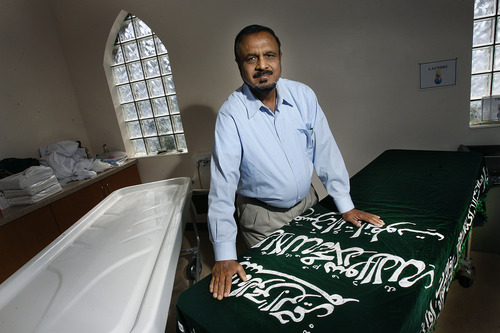This is an archived article that was published on sltrib.com in 2012, and information in the article may be outdated. It is provided only for personal research purposes and may not be reprinted.
On Memorial Day, Muslims will find their way to Redwood Memorial Estates, which has a section blocked out specifically for Utah's Islamic dead.
Many go every Thursday evening to the cemetery that straddles West Jordan and Taylorsville, but they may also use the holiday as another chance to remember those who have passed.
Every day, the Islamic Society of Greater Salt Lake stands ready to help Muslims at their time of pain and sorrow, says Sheikh Maqbool Ahmed, the society's current board chairman. It is a sacred responsibility, he says, one they willingly shoulder.
Did you know that a Muslim should be buried as soon after death as possible, preferably within 24 hours?
If a person dies in the morning, the Islamic community would try to bury the body by afternoon. If the death occurs in the afternoon, it might not happen until the next morning. "If someone dies even on the road, if a family calls, we will go and get the body," Ahmed says. "Any Muslim who calls us, no matter where or what his financial situation, we'll deal with them."
Did you know that there are religious rituals before the burial?
The body is taken to a special room (built at Redwood Memorial Estates for this purpose), where it is washed with clean and scented water. Men wash male bodies; women do the same for females.
After washing, the body is covered in a seamless, white cloth (usually cotton or linen), much like the clothes Muslims wear during the annual hajj, or pilgrimage, to Mecca. Those who perish as martyrs are buried in the clothes they wore at the time of death.
Muslim bodies are put in essentially a cardboard box for depositing in the ground, facing east toward Mecca.
Did you know Muslim funerals consist of only one prayer?
At the gravesite, an imam or prayer leader directs the mourners in a simple prayer, acknowledging God's greatness. They do it while standing, rather than bowing or touching their foreheads to the ground as they do during the five daily prayers.
Did you know Islam discourages headstones or markers?
That's especially true if they are on the ground, Ahmed says. "If we put our foot on [a headstone], we are putting our foot on the word of God."
Did you know the Islamic Society doesn't charge for most of its services?
The washing and shrouding are free, Ahmed says, and the burial is "very cheap" — $200 for those who can afford it; otherwise it's free. The Islamic Society has a permanent fund of $10,000, which it uses for burials. If they tap any of it, members then raise more money to replenish it.
Did you know Muslim believe the dead wait in their graves until they are resurrected?
"They make their life in the grave," Ahmed says. "The soul doesn't die, it's still there."
He adds: "If you are lying with a good soul, you are living in a good neighborhood."
Additional source: islam.about.com



